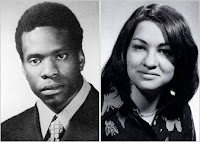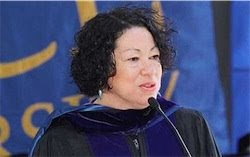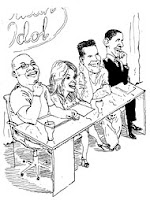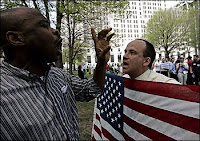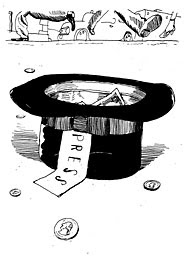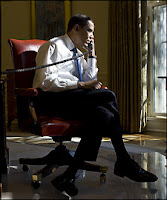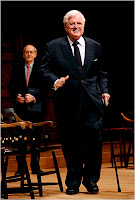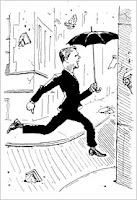Minnesota Nice — David Carr reports on the state that gave us Al Franken, Jesse Ventura, and Lake Woebegone.
At the St. Paul Civic Center in 1982, what should have been a routine re-election convention for the Republican Gov. Albert Quie was underway, but he had dropped out before it had begun.
A newbie reporter to Minnesota politics, I watched as democracy broke out in earnest on the convention floor over the fight to replace him. There were walkouts, prayer meetings, candidacies that came and went in the blink of an eye, all perpetrated by delegates who had the stamina of Marines. Their various causes righteous, their faces flushed with excitement, they went into extra innings, deep into the night. My head spinning, I climbed up into the bleachers and sat near a shaggy-looking guy in a shiny hockey jacket from Anoka. We watched the full pageantry of electoral politics silently and then I finally looked down the row and spoke. “Is it always like this?”
“Yes,” the man said, turning toward me. I recognized him as someone who should know: Garrison Keillor.
Mr. Keillor was already on his way to legend as the host of “A Prairie Home Companion,” but there he was staring in fascination at one of the most rococo expressions of state democracy in the land. Lately, everyone else has been watching Minnesota politics as well because the race between the Republican senator Norman Coleman and Al Franken, the comedian and radio host, ended in a deadlock. (A third-party candidate, a frequent feature of Minnesota elections, altered the math.) After a ruling of the Minnesota Supreme Court on Tuesday, more than seven long months after the election, Mr. Franken will become Senator No. 60 for the Democrats, a significant number because it could help make the Senate filibuster-proof.
It may not be a stretch to say that the nation’s governance hinges, in part, on the arrival of the man who played Stuart Smalley, a simp who was a bit too eager to put the self in self-help on “Saturday Night Live.” On Wednesday, a question I knew was coming arrived from a friend on the bus: “What is up with Minnesota politics, anyway?”
To which I say, as opposed to what? New York? Florida? California? And as a former Minnesotan who lives in New Jersey, don’t even get me started about politics, Garden State-style.
Yes, Minnesotans vote like crazy. At 77.8 percent, the state had the highest turnout in last year’s very busy presidential election. But yes, sometimes Minnesotans’ votes seem just plain crazy as well.
Continued below the fold.
The Downside of Being Mavericky — Sam Tanenhaus notes that Sarah Palin’s sudden announcement that she’s resigning as the governor of Alaska is just another in the interesting turn down the road to entropy for the GOP.
Grant the Republicans this much at least: they’re no longer boring. Just when the novelty of the Argentine dalliance of Gov. Mark Sanford of South Carolina had begun to fade, Gov. Sarah Palin of Alaska enlivened a ho-hum Fourth of July with her announcement that she would abruptly terminate her first term and instead seek to “effect positive change outside government.”
Exactly what this might mean was not immediately clear. Some said her political career was done. Others speculated that Ms. Palin, eying the White House in 2012, plans to complete and then hawk her memoir (for which she reportedly had been seeking a seven-figure advance) and also increase her visibility along with her war chest by accepting lucrative speaking engagements — activities not so easily managed by a chief executive marooned in Anchorage.
“Some are going to question the timing of this,” Ms. Palin acknowledged when she made her announcement on Friday, though she said “this decision has been in the works for quite a while.”
Perhaps, but to judge by the surprised reactions of top Republicans across the country, very few seemed to have been consulted or even tipped off that it was coming.
The announcement by the freelancing politician may be the best example yet of the striking transformation in the current Republican Party. Only a few years ago, the party was considered a model of lockstep discipline with around-the-clock message control and seamless coordination of policy and politics. But from all appearances, it has entered a period of inner confusion, verging on the dysfunctional. Some of that dysfunction was on display earlier last week, when word surfaced of a Vanity Fair profile of Ms. Palin that showed her often to be at odds, and sometimes at swords’ point, with Alaska Republicans and also with party strategists when she ran on the Republican ticket with John McCain in 2008.
How did so organized a party come apart so swiftly? One explanation is that it hasn’t been swift at all. The Republicans have been in decline for some time — and in recent years, even in disarray. Since the peak years of Republican success in the 1980s, the party’s candidates have only sometimes been vote-snagging virtuosos. Dating back to 1992, Republicans have won a plurality in only one presidential election — and that lone victory, in 2004, was not nearly the triumph it appeared to be at the time. Its architect, Karl Rove, spoke of establishing a “permanent majority” for the Republicans, but in reality Mr. Bush won by less than 3 percentage points — one of the narrowest re-elections in presidential history. And although he claimed a mandate, his two big second-term initiatives — privatizing Social Security and immigration reform — were easily thwarted. Some of the strongest opposition came from within Mr. Bush’s own party — further evidence that the Republicans were even then losing their cohesiveness.
Leonard Pitts, Jr. — Mark Sanford did not make a mistake.
I have a proposal.
Next time some politician goes before the cameras with his figurative pants down around his metaphoric ankles and says, ”I made a mistake,” let’s form a mob and drag him from the podium. You bring the lanterns, I’ll bring the pitchforks.
South Carolina Gov. Mark Sanford is, of course, the latest. Having bought plane tickets, told his staff he would be away hiking the Appalachian Trail, left his wife and kids behind and flown to Argentina to rendezvous with his paramour, he apologized by saying he’d made a mistake.
Before we go any further, let me concede the obvious. Yes, all human beings make mistakes. That’s how you know they’re human beings.
But surely I’m not the only one to notice how ”I made a mistake” has become the go-to explanation for every human houndog in public office. It’s been dragged out by or on behalf of everyone from Jesse Jackson to Kwame Kilpatrick to John Edwards to L.A. mayor Antonio Villaraigosa to former Pennsylvania Rep. Don Sherwood to Gary Hart to Eliot Spitzer to Sen. John Ensign to Bill Clinton.
It isn’t the cheating I’m complaining about. Nor is it the lying (which is, after all, an integral part of the cheating.) And for our purposes today, we can even ignore the hypocrisy of self-proclaimed moral champions — particularly family-values conservatives like Gov. Sanford — getting busy with women who are not their wives.
No, what incites this diatribe is those four words of putative explanation: ”I made a mistake.” There is to them a connotation of honest error, unwitting miscalculation, accidental omission and ”Oops, my bad.” They allow the offender to appear to accept responsibility for his offense while at the same time, minimizing it. He just misjudged. It just happened. He was just careless, inattentive or forgetful. He couldn’t help it.
The excuse has never been flimsier than it is in the post-Bill Clinton era. I mean, if I put my hand into a fire because I’ve never seen fire before and I get burned, that is a mistake. If you see me get burned and then put your hand into the same fire, that’s not a mistake. That’s an idiotic calculation that somehow, the rules do not apply to you.
So what does it say about the politician who saw Clinton burn his public and political lives to bits, then turns around and does the same thing he did? I’ll tell you what it says. It says he’s a fool.
And it also says he’s a man, though some might argue that’s a synonym. But surely you’ve noticed that the list of cheating hearts in high office is rather, shall we say, testosterone-exclusive. It is not that women are paragons of marital virtue. A 2008 study by the National Science Foundation found that 15 percent of women over 60 admit to having had an affair in their lifetimes, and that the rate of female infidelity is actually growing faster than that of males.
And yet, when’s the last time you saw a woman governor saying, ”I made a mistake,” while her husband stood there looking as if he might toss up his lunch any second? Apparently, your average woman governor-elect has the good sense to tell Sven the Swedish poolboy that she’s about to enter the public eye, and their long lunches will have to end. The man governor-elect figures he can get away with it. With the arrogance, recklessness, self-delusion and lack of foresight common to my gender, he figures he can handle it, somehow. Granted, he does this figuring with the part of the body that does not contain the brain, but still, he does it. And then, when it all falls apart, he stands there and insults the intelligence of every human being within earshot.
”I made a mistake?”
Beg pardon, but what he made was a decision.
Doonesbury — Reading the epithets.







